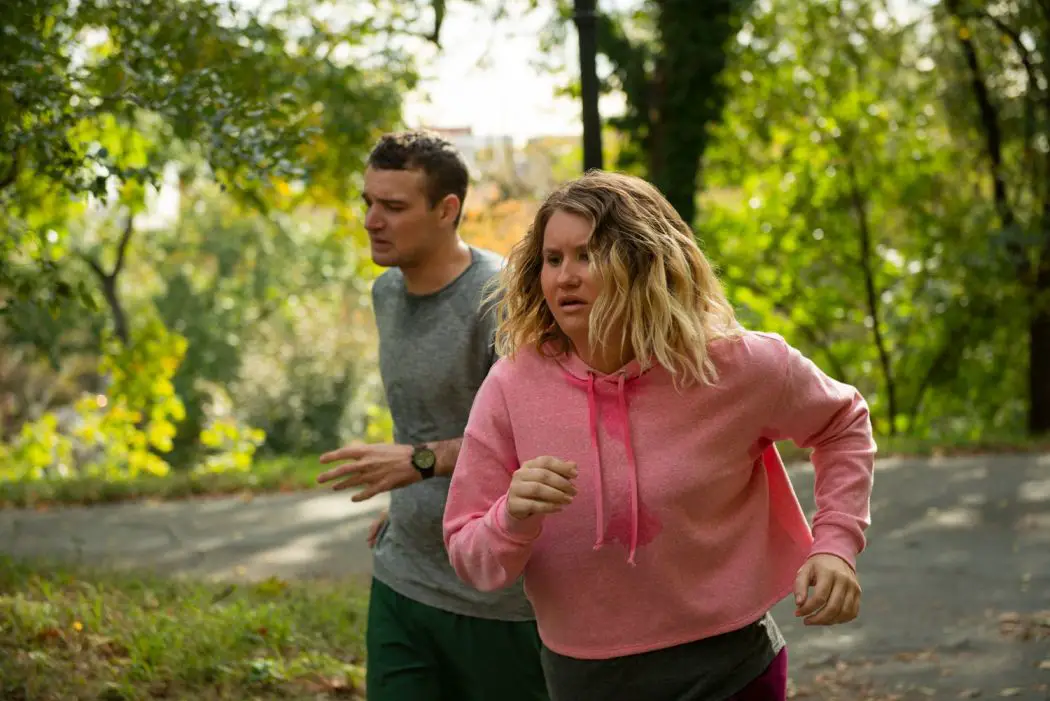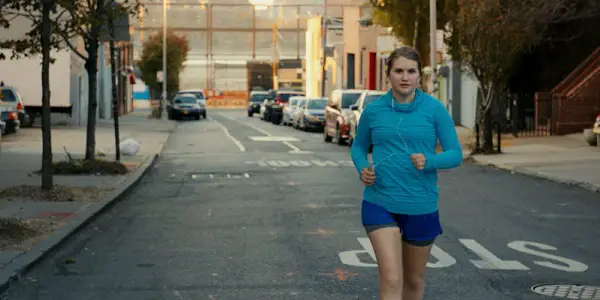Paul Downs Colaizzo & Jillian Bell Talk BRITTANY RUNS A MARATHON, Method Acting, Trying On Drama & More

Alex Arabian is a freelance film journalist and filmmaker. His…
Playwright Paul Downs Colaizzo and comedian and comedic actor Jillian Bell both gracefully accomplish a set of firsts to add to their rapidly-expanding resumes with the accompanying release of Brittany Runs A Marathon, hitting theatrical wide release this week. Bell is, perhaps, most well-known for her scene-stealing supporting roles in Workaholics and 22 Jump Street, both films in which she flexes her improvisational skills and penchant for slapstick. However, not only does Brittany Runs A Marathon mark her dramatic film debut, it also marks her first starring role. Bell proves that she can do both with ease, no matter the mental or physical strains that the role may require.
For Colaizzo, Brittany Runs A Marathon is his feature film debut. An earnest crowdpleaser, the film has far more to offer to its audience than its misleadingly one-note title. It’s about having the courage to enact change in one’s life, taking ownership of one’s faults, accepting one’s differences as gifts, withholding judgment, learning to be vulnerable, and making human connections.
Approaching their new film’s theatrical run, I had the chance to speak with Colaizzo and Bell about the casting process, the necessity for Bell to go method, her fitness routine for her remarkable transformation, production challenges, the real Brittany, giving sidekicks a shot at leading roles, and more.

Alex Arabian for Film Inquiry: Paul, at what point did you realize during Brittany’s transformation that you had to turn this into a film?
Paul Down Colaizzo: Right when she went for her first run was the idea. It came to me, just because she was the funniest person I’d ever met and she was earnestly pursuing a goal. She wasn’t being ironic at all. There was no humiliation involved here. There was just aspiration.
How did you find your Brittany?
Paul Down Colaizzo: She was in a dumpster [laughter].
Jillian Bell: I have shot something in a dumpster before, so that could’ve been true.
Was that in Workaholics?
Jillian Bell: Yes, that was Workaholics.
Paul Down Colaizzo: I was meeting with actresses. I met with Jillian in the cafe of a Williamsburg hotel. She was immediately protective of the character. She had a full understanding of the script and the story and the woman, and was coming with empathy and sympathy and personal experience. And it just felt like we both had a story to tell, here, and we both had a similar story to tell, and we both had similar dreams for this script of mine. And we had another phone call after that where we talked about process, and it was so obvious that Jillian, who the world knows as a comedic actress and a comedic scene-stealer, had this depth of humanity to her that was unexplored, and vulnerability, and pain, and insecurity that needed an outlet. And it felt like that was exactly the same journey the character was going to go on. We decided to do it together. We had a lot of conversations. We met for rehearsal in a bungalow in Los Angeles just to sort of talk through the script, and she said one line as Brittany and I was like, “Oh my god. We’re going to be in really incredible shape. Wow.”
Jillian Bell: Thanks, Paul.
Paul Down Colaizzo: It’s true.
Jillian, first of all, incredible performance. I was moved to tears. Was it always your intention to go method and lose weight as part of your transformation, or was that something that you and Paul talked about during development?
Jillian Bell: When I read it, I thought, “How could I not go through that experience?” Because it was such a big part of what she goes through, and her emotions and where she’s at, mentally, and I related so much to her story. But there were parts that were missing, big holes, and that was connected to her physical journey. And I thought, “Well, if I don’t experience that for myself, I’m missing out on a big part of this character.” So, I talked to Paul, and they never asked me to do this, but thought, “I’m going to try to lose the same amount of weight that she loses, and just see how hard that is, and how challenging it is, and how emotional it is,” and I will say I checked all of those boxes [laughter]. It was very emotional, but I learned so much about the character and about myself.
What was your fitness routine?
Jillian Bell: You know what’s funny is people don’t actually ask about that part. I would get up, and before I did anything, I would go on the treadmill for 45 minutes, and then I would prep my meals throughout the day. It was a lot of boring stuff, brown rice, vegetables, chicken, salmon. And then I would work out again, and in between I would just be prepping for the film. So, I was living and breathing it for a very long time.
Paul Down Colaizzo: She gave her life to it.
I could imagine. As you show in the film, there are challenges that one faces when trying to make such a big life change. You put strain on friendships. There are health and diet setbacks, among other things. What were some of the challenges or setbacks you two faced during production? Specifically, the marathon, Paul. It was the first time someone’s ever filmed during the New York Marathon. And for you, Jillian, were there any challenges committing to the character throughout the length of the production?
Paul Down Colaizzo: Specific to the marathon, they were so supportive once it was a go. They were so, incredibly on board with the message of the movie, and they gave us really, very special access to film there. Unprecedented access. The biggest challenge, and honestly what made it a curveball, in a way, in terms of our production schedule, is the first week of prep was dedicated to explaining to the New York roadrunners how we would do the marathon. And that took away a lot of my prep time, so there was a lot of focus on storyboarding moments so that they could understand the emotionality and the technicality of what we were going to do. It cut prep, basically, by a third, so that put a rush on the rest of the process. But everyone was a team player and it worked out. We needed that support.
Jillian Bell: Committing to the character wasn’t the biggest challenge because I was living and breathing her for about a year. I attached this seven months before we started shooting, and I was already getting into that space. But it was honestly just probably emotions I was dealing with, stuff that I had struggled with for a long time about my own body issues and how I treated myself. I struggled with that because I thought, “Well, now I’m playing this character who goes through her own story, her own version of this, and she comes out to this beautiful other side. And now I want to do that for myself.” So, honestly, letting go of the character at the end was one of the hardest, because now I have to return back to me and figure out what my goals are, and my values, and how I want to treat myself. I learned a lot from playing Brittany.

I love the body positivity message, and the loving yourself message that really comes through in the end. Do you hope this contributes to the discourse of loving yourself in the age of the heightened social media negativity and impossible body standards in media?
Paul Down Colaizzo: I hope that this movie goes along with the conversation that there is a world that is teaching us not to love ourselves. It’s not all internal. Finding self-worth is not something you can do independent of the world you live in. And what we wanted to do in this film was acknowledge the way the world treats you when you look a certain way, both ways, all ways, and how that can affect your self-esteem. And ultimately, out of that, that what we have control over is defining our own values and what matters to us, and using that as our rubric moving forward regardless of what the world tells us. It’ll always influence us. It’ll always affect us. The self-esteem conversation is a cyclical conversation you have with yourself based on where you are in life and where the world is with you, but we want to be part of the progress that acknowledges the world we live in in the conversation of self-worth. Right? There are problems in the world that work against your self-worth. It’s the Lizzo speech from the VMAs.
The film subverted expectations. There were so many times I thought it might resort to a cliché. There are movies with exaggerated characters like that, but this never did that.
Jillian Bell: People will bring up certain films and say, “They did it wrong and you guys did it right,” or, “We did it wrong and they did it right.” And it’s so good to have all conversations about body image, and women as the leads, as a part of our industry and how we move forward. Because women make up a good percentage of this world, and we need our voices out there and saying all different things.
Paul, what play of yours did Toby Maguire attend to convince him to–
Paul Down Colaizzo: Give me $5 million [laughter]?
–creatively become involved with you?
Paul Down Colaizzo: It was called Really Really. It was off Broadway in 2013. It starred Zosia Mamet and Matt Lauria.
And how did you pitch Brittany Runs a Marathon to him?
Paul Down Colaizzo: I said, “It’s a story about my friend who gets her shit together training for the New York City Marathon.” They bought it off the logline.
If there is a proxy character in this film for you, who would it be?
Paul Down Colaizzo: Seth. If there was one, it’d be Seth. The whole concept of this film is we’re taking people who are typically sidekicks or best friend roles, letting them play in that comedic sandbox, and then de-bidding them and giving them layers and pathos and humanity, in colors you may not expect to see them in a comedy. For me, it was really important to show a gay couple who didn’t have that much drama, who had sort of pedestrian desires, and a gay best friend who was supportive [but] that the woman wasn’t the center of his existence. So often in a film it’s just like he is there for her, and it’s like here he’s there for her, but he also has a life. There’s a shot towards the end of the film where we see him in bed with his husband and their two kids. Very important for me to have that shot in the film.
That was amazing. Jern is such a great character. Love him.
Paul Down Colaizzo: And Utkarsh [Ambudkar].
Jillian Bell: Utkarsh is incredible.
He’s awesome. How did that inception or development of this character unfold?
Paul Down Colaizzo: He was in the script. The scripts didn’t change that much from when [Jillian] came on. Moments did, but the story was what it was. I wanted [Jern] to be a man-child, and his name was always Jern, and then I cast Utkarsh and I thought, “Do I need to change his name?” Because she has a line where she makes fun of his name, and I was like, “Is this insensitive? Is this offensive if his name is Jern and she’s saying, ‘Why the f*ck did your parents name you Jern?'” But then we turned that into a funny moment where he doesn’t even know where his name came from, and she’s concerned that she offended him. But the character was supposed to be a man-child. Much in the way that Brittany is in a state of arrested development, he was too, and she judged him. And we felt like at that point in the story, this guy who is a child, just as she’s been a child up until this point of the film, it might tease her back into her old ways. But weirdly, they inspire each other to grow up.
Speaking of the supporting cast, they’re superb all around. Can you speak a little bit about how the casting process took hold?
Paul Down Colaizzo: I can’t imagine this movie with anyone else except for these people. We had such a beautiful ensemble of people who were dedicated to the message of the film, the idea of the film, the tone of the film.
Jillian Bell: We talked a lot, early on, about having people who, obviously, would nail it, and come in, and bring their talents, but what we didn’t expect was good people. Like, good-hearted people that really cared about the message of the film. And once the cast started coming together, we’re like, “Oh, we are surrounding ourselves with, basically, angels.” People who are really looking out for not only what we’re saying, but us as human beings, because we’re taking a huge gamble on each other. I had never done a project like this before with dramatic elements and playing the title character, and he’d never directed anything.
Paul Down Colaizzo: In that bungalow where we had our first meeting, I said, “This movie is either both of us succeed, or neither of us succeed.” And we knew that, and everyone who was working on it knew that, and they all wanted us to succeed. I’m proud of everybody.
Jillian Bell: Me too.
Paul Down Colaizzo: We all succeeded on this film because we made exactly what we wanted to make.
Jillian, you and Michaela [Watkins] have run in the same professional circles before, right?
Jillian Bell: We both met through the program with the Groundlings, and she was a Groundling before me, and then I got in. I don’t even think we did any sketches together, unfortunately, but I always respected her work and she was always one of the funniest people on the planet. And then this came up, and I just couldn’t stop thinking about her, and Paul adored her, and it just kind of worked out. And then, after this, she pitched me for Sword of Trust, and then we ended up doing that together in Alabama.
Oftentimes, actors portraying characters based on real life will choose not to meet those whom they’re portraying so that they can try to make the character their own in some way. Was this one of the contributing factors to why you didn’t meet Brittany until after production?
Jillian Bell: I would’ve loved to meet her before we started shooting, but she was in New York, I was in LA, and it didn’t work out.
Paul Down Colaizzo: It’s a fictional version of her.
Jillian Bell: Yeah, and that’s what I was going to say.
Paul Down Colaizzo: There’s Brittany O’Neil and Brittany Forgler. There are things that this character Brittany has done in the film that Brittany O’Neil has never done. There are backstory plot points that are not the backstory plot points that Brittany has, so it was really important that I was creating a character that I felt could tell the narrative well, and then I could hand that character off and give Jillian that ownership.
Jillian Bell: And then I could create that, and we could create that together somewhat before we started shooting. And like Paul always says, Brittany’s DNA is all over it. It’s truly a love letter to his best friend.
Jillian, you’ve proven yourself more-than-adept at comedy and now drama. Going forward, which roles would you like to focus on?
Jillian Bell: I’d like to do them all, if I could. All of the roles. All of them.
Paul Down Colaizzo: You’ve got to pick [laughter].
Jillian Bell: I’d love to do more drama. My heart loves comedy. I want to play a witch, and I want to play a woman that you don’t expect to save the world and she does. I would love to play a range of characters that feel very nuanced.
Paul Down Colaizzo: I just had an idea for something. I’ve read a script about a witch who saves the world. I swear to god.
Jillian Bell: Well there we go. So you heard it here first. I’m doing that script.
Film Inquiry would like to thank Paul Downs Colaizzo and Jillian Bell for their time and insight.
Watch Brittany Runs a Marathon
Does content like this matter to you?
Become a Member and support film journalism. Unlock access to all of Film Inquiry`s great articles. Join a community of like-minded readers who are passionate about cinema - get access to our private members Network, give back to independent filmmakers, and more.
Alex Arabian is a freelance film journalist and filmmaker. His work has been featured in the San Francisco Examiner, The Playlist, Awards Circuit, and Pop Matters. His favorite film is Edward Scissorhands. Check out more of his work on makingacinephile.com!













